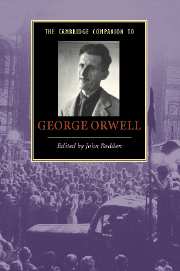Book contents
- Frontmatter
- 1 A political writer
- 2 Orwell and the biographers
- 3 Englands His Englands
- 4 The truths of experience: Orwell’s nonfiction of the 1930s
- 5 The fictional realist: novels of the 1930s
- 6 Orwell’s essays as a literary experience
- 7 ‘My country, right or left’: Orwell’s patriotism
- 8 Orwell and the British Left
- 9 Orwell, anti-Semitism and the Holocaust
- 10 Orwell, Socialism and the Cold War
- 11 Animal Farm: history as fable
- 12 Nineteen Eighty-Four: context and controversy
- 13 Orwell, the academy and the intellectuals
- 14 Orwell for today’s reader: an open letter
- 15 George Orwell: a bibliographic essay
- 16 Why Orwell still matters
- Further reading
- Index
15 - George Orwell: a bibliographic essay
Published online by Cambridge University Press: 28 July 2007
- Frontmatter
- 1 A political writer
- 2 Orwell and the biographers
- 3 Englands His Englands
- 4 The truths of experience: Orwell’s nonfiction of the 1930s
- 5 The fictional realist: novels of the 1930s
- 6 Orwell’s essays as a literary experience
- 7 ‘My country, right or left’: Orwell’s patriotism
- 8 Orwell and the British Left
- 9 Orwell, anti-Semitism and the Holocaust
- 10 Orwell, Socialism and the Cold War
- 11 Animal Farm: history as fable
- 12 Nineteen Eighty-Four: context and controversy
- 13 Orwell, the academy and the intellectuals
- 14 Orwell for today’s reader: an open letter
- 15 George Orwell: a bibliographic essay
- 16 Why Orwell still matters
- Further reading
- Index
Summary
After decades of financial struggle as the author of four naturalistic novels, three critically acclaimed but politically controversial documentaries, and a body of literary essays and journalism, suddenly Orwell emerged as a major writer of international repute with two satires, the political allegory of Animal Farm in 1945, and the dystopian satire Nineteen Eighty-Four, published in 1949, a few months before his death. A wide array of critical reviews by Golo Mann, Lionel Trilling, Arthur Koestler, V. S. Pritchett and Bertrand Russell among others - some of them also taking the shape of obituaries - identified his last novel as an outstanding achievement. In his 2003 Scenes from an Afterlife: the Legacy of George Orwell, John Rodden points out that after his early death, Orwell's life became a legend still vital and alive all over the world today, an observation echoing the one made by Jenni Calder in what Gunter Grass called, aptly, the Orwell decade of the 1980s. Orwell's last two novels, Calder states, are not only part of our literary tradition and heritage, but [also] have entered our mythology (Animal Farm and Nineteen Eighty-Four: Open Guides to Literature, 1987). But figures in mythology are not necessarily beyond political controversy. Providing an encyclopedic view of the controversies in Orwell's reception up to the mid-1980s, in The Politics of Literary Reputation: The Making and Claiming of St George Orwell (1989) Rodden outlines not only a picture gallery of Orwell's widely different critical portrayals as The rebel, The common man, The prophet and The saint, but also the battles among the body snatchers, critics of the most diverse political persuasion, who argue that if Orwell, the man who claimed to fight for democratic socialism and against totalitarianism, were alive today, he would be on their side.
- Type
- Chapter
- Information
- The Cambridge Companion to George Orwell , pp. 190 - 200Publisher: Cambridge University PressPrint publication year: 2007
- 1
- Cited by

